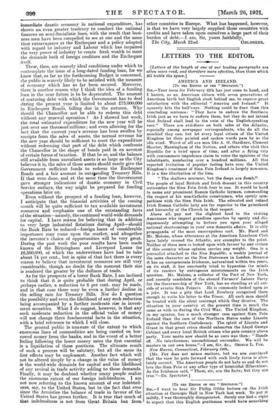LETTERS TO THE EDITOR.
[Letters of the length of one of our leading paragraphs are often more read, and therefore more elective, than those which fill treble the space.3
.1.1•11■1■■11
AMERICA AND IRELAND.
(To THE EDITOR Or THE " SPECTATOR."]
SIR,—Your issue for February 12th has just come to hand, and I hasten, as an American citizen with seven generations of American birth but English stock behind me, to express great satisfaction with the editorial " America and Ireland." It squarely hits the bull's-eye. Nothing could be finer than this concluding sentence: " They have to endure the Southern Irish just as we have to endure them, but they do not intend that Ireland shall lead to the ruin of the English-speaking race." There are evil-doers on both sides of the Atlantic, especially among newspaper correspondents, who do all the mischief they can, but let every loyal citizen of the United Kingdom let their printed and spoken words pass by as the idle wind. Worst of all are men like A. G. Gardiner, Clement Shorter, Massingham of the Nation, and others who visit this Republic for a brief space of time, and after a flying trip with consummate impudence claim to voice the opinions of the inhabitants, numbering over a hundred millions. All this reported irritation of popular feeling here over the United Kingdom's treatment of Sinn Fein Ireland is largely nonsense. It is a fine illustration of the line,
" The shallows murmur, but the deeps are dumb.". The people of loyal British and Irish descent in this country outnumber the Sinn Fein Irish four to one. It would be hard to name any prominent Roman Catholic layman, commanding the respect of his non-Catholic countrymen, who openly sym- pathizes with the Sinn Fein Irish. The educated and refined Irish Raman Catholic laity are far superior to the priesthood and hierarchy of the Church in that respect.
Above all, pay not the slightest heed to the visiting Americans who import grandiose speeches by openly and dis- ingenuously attempting to lecture you upon your alleged national shortcomings in youi own domestic affairs. It is.silly propaganda of the most unscrupulous sort. MT. Hard and Mr. Malone, whose utterances at the American Luncheon Club have lately crossed the Atlantic, are examples to the point. Neither of these men is looked upon with favour by any citizen of this- country whose opinion carries any weight. One is a journalist attached to the New Republic, a weekly journal of the same character as the New Statesman in London. Because it has an unregenerate Irishman, naturalized within ten years, on its staff, it has constantly tried to hypnotize the minds of its readers by outrageous misstatements on the Irish question. Mr. Malone, a collector of the Port of New York, and recently candidate of the absurd Farmers' Labour Party for the Governorship of New York, has no standing at all out- side of erratic Sinn Feiners. 11e is commonly looked upon as
a joke. It was a pity that Lord Rosebery recognized them enough to write his letter to the Times. All such men should be treated with the silent contempt which they "deserve. The situation in your country at the present time is much the same as with us during the Civil War. The United Kingdom, in my opinion, has a much stronger case against Sinn Fein Ireland than the case of the Northern States under Lincoln against the Southern Confederacy. The spirit of Lincoln and Grant in that great crisis should enhearten the Lloyd George Cabinet and every loyal British citizen who puts country above party. Your motto now should be as ours was then: " Hands off. No interference; unconditional surrender. We will be 'masters in our own hOuse."—I am, Sir, Sse., GEORGE L. Fox.
New Haven; Connecticut, February 24th.
[Mr. For does not mince matters, but we are convinced
that the view he puts forward with such lively force is abso- lutely correct. The American people do not bate us and do not love the Sinn• Fein or any other type of homicidal Hibernians. As the Irishman said, " These, sir, are the fadts; but they are true."—En. Spectator.]


































 Previous page
Previous page